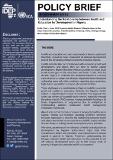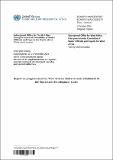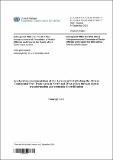Our Institutional Repository is currently undergoing an upgrade. The platform remains accessible for search and consultation. However, user login and content submissions are temporarily disabled. We appreciate your understanding.
Devaluation and structural adjustment : the Nigerian experience
| dc.description.abstract | Nigeria, like many other African countries, has had to devalue its currency substantially in recent years as part of the Structural Adjustment Program (SAP) undertaken with World Bank prodding and support. Both before and after devaluation, the policy has given rise to great controversy, and the debate continues both internally and externally. There are many reasons why Nigeria provides a special but interesting case of the impact of devaluation on the national economy. First, it is a country with a potentially large market where, with proper planning, the domestic economy ought to provide a dynamic factor in economic development. Second, oil exports account for over 90 per cent of exports. Third, the foreign exchange earnings from oil exports come directly into the hands of the government, and the basic issue of policy is essentially how these resources are to be allocated for the most efficient uses. Fourth, in many areas there is close interconnection between production of food and raw materials for domestic use, and production for exports, so that an increase in exports may create shortages in supplies for domestic use and therefore fuel domestic inflation. The paper conclude that the costs of devaluations, in terms of inflation, greater macroeconomic uncertainty and less investment, may be greater than are often thought, and that the benefits, at least for primary producers, do not seem as strong as have often been claimed. | en |
| dc.title | Devaluation and structural adjustment : the Nigerian experience | en |
| ags.descriptionNotes | "November 1992." | en |
| ags.descriptionNotes | "ECA/SERPD/1992/006." | en |
| ags.descriptionNotes | Includes bibliographical references (p. 51-54). | en |
| ags.descriptionNotes | The document has originally a page miss number (2) | en |
| ags.publisherPlace | Addis Ababa : | en |
| ags.publisherName | Socio-economic Research and Planning Division, UNECA, | en |
| ags.citationTitle | Development research papers series (Economic Commission for Africa) ; | en |
| ags.citationTitle | no. 3 | en |
| dc.coverage.spatial | Nigeria | |
| dc.date.accessioned | 2011-01-08T19:14:04Z | |
| dc.date.available | 2019-03-20T11:49:27Z | |
| dc.date.issued | 1992 | |
| dc.identifier.uri | https://hdl.handle.net/10855/15127 | |
| dc.format.extent | iii, 54 p. : | |
| dc.language | eng | |
| dc.type | Working paper | |
| uneca.workflow.processed | true | |
| ags.creatorPersonal | Onitiri, H.M.A. | |
| ags.creatorCorporate | United Nations. Economic Commission for Africa. Socio-economic Research and Planning Division. | |
| ags.subjectThesaurus | ECONOMIC POLICY | |
| ags.subjectThesaurus | STRUCTURAL ADJUSTMENT | |
| ags.subjectThesaurus | ECONOMIC REFORM | |
| ags.subjectThesaurus | CURRENCY | |
| ags.subjectThesaurus | DEVALUATION | |
| ags.subjectThesaurus | POLITIQUE ECONOMIQUE | |
| ags.subjectThesaurus | POLITICA ECONOMICA | |
| ags.subjectThesaurus | AJUSTEMENT STRUCTUREL | |
| ags.subjectThesaurus | AJUSTE ESTRUCTURAL | |
| ags.subjectThesaurus | REFORME ECONOMIQUE | |
| ags.subjectThesaurus | REFORMA ECONOMICA | |
| ags.subjectThesaurus | MONNAIE FIDUCIAIRE | |
| ags.subjectThesaurus | MONEDAS | |
| ags.subjectThesaurus | DEVALUATION | |
| ags.subjectThesaurus | DEVALUACION | |
| ags.subjectClassification | 07.05.00 Financial Economics | |
| ags.citationNumber | no. 3 | |
| ags.availabilityNumber | 338.24 | |
| ags.availabilityNumber | DRP3 | |
| ags.availabilityLocation | ECA-HQ | |
| ags.rights.termsofuse | public | |
| ags.RN | ECA/SERPD/1992/006 | |
| ags.JN | 59491 | |
| uneca.language.supported | en |
Files in this item
This item appears in the following Collection(s)
-
Development Finance [1560]
-
Economic Development [8123]




